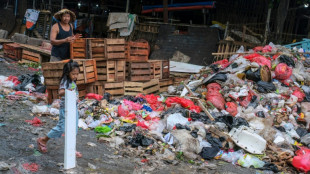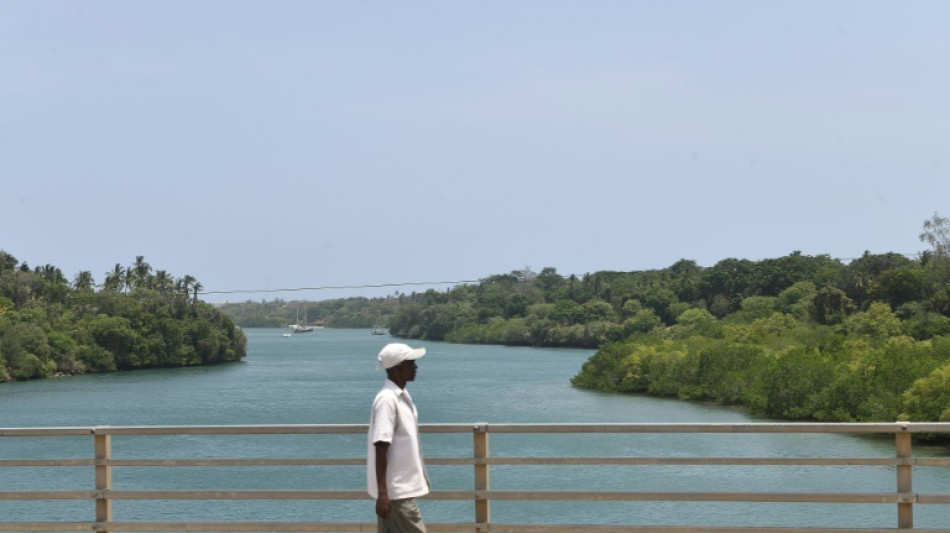
-
 Williams 'on the back foot' after missing Barcelona: Albon
Williams 'on the back foot' after missing Barcelona: Albon
-
Real Madrid submit evidence to UEFA in Vinicius racism probe

-
 Olympics rev up Milan's renewal but locals fear price to pay
Olympics rev up Milan's renewal but locals fear price to pay
-
Cardona Coll, Fatton win Olympic-debuting ski mountaineering sprint golds

-
 MSF will keep operating in Gaza 'as long as we can': mission head
MSF will keep operating in Gaza 'as long as we can': mission head
-
Russian Filippov wins first medal at Milan-Cortina Games for individual neutral athletes

-
 Italian Milan takes sprint honours at UAE Tour
Italian Milan takes sprint honours at UAE Tour
-
Dozens killed in jihadist attacks in northwest Nigeria

-
 Zimbabwe unbeaten in T20 World Cup after six-wicket Sri Lanka win
Zimbabwe unbeaten in T20 World Cup after six-wicket Sri Lanka win
-
Postecoglou admits taking Nottingham Forest post a 'bad decision'

-
 Switzerland's Fatton wins women's ski mountaineering sprint on Olympic debut
Switzerland's Fatton wins women's ski mountaineering sprint on Olympic debut
-
Kinghorn, Van der Merwe return for Scotland against Six Nations strugglers Wales

-
 Repsol says could boost Venezuela oil output over 50% in 12 months
Repsol says could boost Venezuela oil output over 50% in 12 months
-
UN says Israeli actions raise 'ethnic cleansing' fears in West Bank, Gaza

-
 Arteta tells faltering leaders Arsenal to harness Wolves 'pain' against Spurs
Arteta tells faltering leaders Arsenal to harness Wolves 'pain' against Spurs
-
Crowley gets nod for Irish as Prendergast drops out

-
 Unbeaten Swiss to meet Great Britain in Olympic men's curling semis
Unbeaten Swiss to meet Great Britain in Olympic men's curling semis
-
UK police arrest ex-prince Andrew on suspicion of misconduct

-
 Oil extends gains on US-Iran tensions, Europe stocks slide
Oil extends gains on US-Iran tensions, Europe stocks slide
-
Former prince Andrew, a historic downfall

-
 Sri Lanka post 178-7 against Zimbabwe ahead of T20 Super Eights
Sri Lanka post 178-7 against Zimbabwe ahead of T20 Super Eights
-
OpenAI's Altman tells leaders regulation 'urgently' needed

-
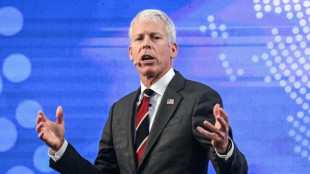 US renews threat to leave IEA
US renews threat to leave IEA
-
Liverpool boss Slot says Isak in 'final stages of rehab'

-
 Airbus ready to build two new European fighter jets if 'customers' ask
Airbus ready to build two new European fighter jets if 'customers' ask
-
UN Sudan probe finds 'hallmarks of genocide' in El-Fasher
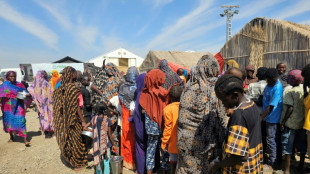
-
 Costelow starts, Hamer-Webb makes Wales debut in Six Nations clash with Scotland
Costelow starts, Hamer-Webb makes Wales debut in Six Nations clash with Scotland
-
Facing US warnings, Iran defends right to nuclear enrichment

-
 Ex-South Korea leader Yoon gets life in prison for insurrection
Ex-South Korea leader Yoon gets life in prison for insurrection
-
OpenAI's Altman says at India summit regulation 'urgently' needed

-
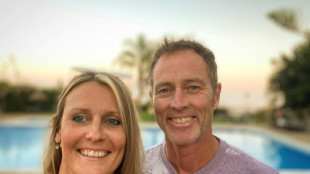 British couple held in Iran sentenced to 10 years
British couple held in Iran sentenced to 10 years
-
West Indies ease past Italy to tune up for T20 Super Eights

-
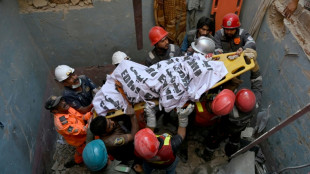 At least 16 killed after building collapses in Pakistan following blast
At least 16 killed after building collapses in Pakistan following blast
-
Summit photo op fails to unite AI startup rivals

-
 OpenAI's Altman says world 'urgently' needs AI regulation
OpenAI's Altman says world 'urgently' needs AI regulation
-
Horror comics boom in our age of anxiety

-
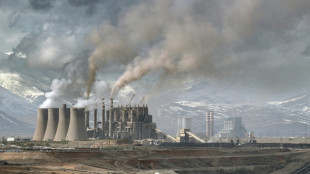 Turkey fires up coal pollution even as it hosts COP31
Turkey fires up coal pollution even as it hosts COP31
-
London fashion week opens with tribute to one of its greats

-
 Ex-S.Korea leader Yoon gets life in prison for insurrection
Ex-S.Korea leader Yoon gets life in prison for insurrection
-
Pea soup, veggie mash contest warms up Dutch winter

-
 South Korea's Yoon: from rising star to jailed ex-president
South Korea's Yoon: from rising star to jailed ex-president
-
Private companies seek to import fuel amid Cuban energy crisis
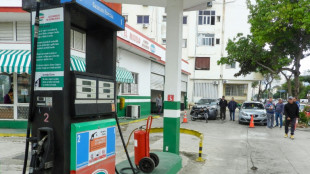
-
 India search for 'perfect game' as South Africa loom in Super Eights
India search for 'perfect game' as South Africa loom in Super Eights
-
India's Modi calls for inclusive tech at AI summit

-
 Airbus planning record commercial aircraft deliveries in 2026
Airbus planning record commercial aircraft deliveries in 2026
-
Elections under fire: Colombia endures deadliest campaign in decades
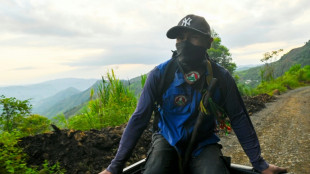
-
 Traore backs 'hungry' Italy against France in Six Nations
Traore backs 'hungry' Italy against France in Six Nations
-
All-rounder Curran brings stuttering England to life at the death

-
 South Korea court weighs death sentence for ex-president Yoon
South Korea court weighs death sentence for ex-president Yoon
-
Tech chiefs address India AI summit as Gates cancels


Kenya jail goes green to fix sewage woes and protect sea
Heading north from Mombasa, the unmistakable whiff of a foul stench in the air was as reliable as any mile marker for motorists taking the highway along the Kenyan coast.
"You would always know you were near Shimo la Tewa Prison," said Stephen Mwangi, a government scientist who has lived for decades in the coastal region where thousands of inmates are incarcerated in a maximum security jail.
The smell wasn't coming from the prison itself but its septic system, which had collapsed from overuse.
Every day, a small river of sewage flowed downhill into Mtwapa Creek, which empties into the Indian Ocean.
The contamination threatened fishing grounds, waterside hotels and restaurants, and the tropical reefs of Mombasa's protected marine park, a jewel of the tourism industry just offshore.
Motorists pinched their noses as they passed over the creek but on the prison grounds, the stench was inescapable.
Government lodgings used by prison wardens and hospital staff were deemed uninhabitable, and abandoned over public health concerns.
"Those who were living in the quarters were really affected by the smell," said Erick Ochieng, deputy officer in charge of Shimo la Tewa Prison.
"It was not good."
- Harnessing nature -
In an effort to solve the perennial menace, a low-cost "green tech" approach is being adopted to treat the wastewater.
An artificial wetland is being constructed on the prison grounds -- a simple yet efficient system that mimics the way nature cleans pollutants from water using vegetation, soil and microbes.
Once fully operational -- expected by end-April -- sewage will first pass through an improved septic tank where solids are separated.
From there, the semi-treated water percolates through underground beds of sand and gravel, filtering out pathogens and other impurities.
The end result should be safe not only for the creek, but irrigating farms or fish ponds around the prison, said Mwangi, a scientist with the Kenya Marine and Fisheries Research Institute, which is involved in the project.
Reeds planted on the surface of the wetland help with filtration and absorb nutrients from below, attracting birds and other wildlife, and beautifying a space few dared linger in the past.
"There will be no smell. We will actually have a very good environment," said Mwangi.
- Climate friendly -
The UN Environment Programme (UNEP), which sponsors the project, said artificial wetlands offered an affordable and versatile solution for sanitation, while storing carbon and helping cool the planet.
Champions of the technology say big cost savings are possible thanks to relatively inexpensive materials that filter the waste through simple gravity.
Traditional sewage systems require huge volumes of concrete to create retention ponds for the waste, and pumps and other electricity-gobbling machinery to treat it.
GreenWater, the Kenya-based company building the Shimo la Tewa system, has constructed sustainable wetland systems for schools, homes, businesses and farms.
The prison complex houses as many as 6,000 people -- convicts but also jail wardens, hospital staff and courthouse officials -- and the project serves as a model for other built-up areas on waterways and beaches.
Home to 40 percent of the world's population, coastal areas are among the most densely populated parts of the planet, UNEP says.
Creeks and inlets along the Kenyan coast self-clean by flushing out water with the ebbing and flowing of tides, said ecologist David Obura.
"The problem is now with just so many people, and so much pressure... that cleaning function has been overwhelmed," said Obura, director of CORDIO East Africa, a Kenya-based oceans research institute.
"It's not working anymore. And you can see it on the Kenyan coast."
Sewage dumped into creeks around Mombasa -- Kenya's oldest and second-largest city -- drifts north on the winds and currents, turning beaches brown and harming coral reefs, seagrass and fisheries.
Obura said it was too late for a major overhaul of sewage systems in crowded cities like Mombasa, but artificial wetlands were a "key tool" for policymakers trying to address the pollution crisis.
"We need to have locally-driven treatment using natural systems, and then I think we can really start to resolve some of these challenges."
P.Martin--AMWN



